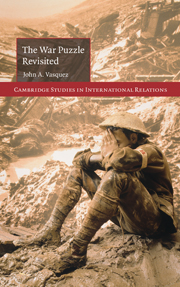Book contents
- Frontmatter
- Contents
- List of Figures
- List of Tables
- Preface
- Preface to the Original Text
- PART I Preliminaries
- PART II The Onset and Expansion of Wars of Rivalry
- PART III Findings on the Steps to War, 1994–2008
- 10 Research Findings on Territory, War, Peace
- 11 Research Findings on Power Politics and War
- Appendix I A Propositional Summary
- Appendix II Major Findings on the Steps to War
- References
- Index
- CAMBRIDGE STUDIES IN INTERNATIONAL RELATIONS
10 - Research Findings on Territory, War, Peace
Published online by Cambridge University Press: 05 June 2012
- Frontmatter
- Contents
- List of Figures
- List of Tables
- Preface
- Preface to the Original Text
- PART I Preliminaries
- PART II The Onset and Expansion of Wars of Rivalry
- PART III Findings on the Steps to War, 1994–2008
- 10 Research Findings on Territory, War, Peace
- 11 Research Findings on Power Politics and War
- Appendix I A Propositional Summary
- Appendix II Major Findings on the Steps to War
- References
- Index
- CAMBRIDGE STUDIES IN INTERNATIONAL RELATIONS
Summary
Facts then theory then back to facts again, and so on and so forth, until you get at the truth.
The War Puzzle (Vasquez, 1993) was born in an intellectual milieu that was still dominated by the realist paradigm, which had held sway since the end of World War II. It seemed like it would continue to hold sway no matter what sorts of criticisms were leveled at it. At the same time, there had emerged a body of research findings spearheaded by the Correlates of War project about the factors associated with the onset of war. These findings, while often, but not always, growing out of realist hunches about the causes of war, were far from consistent, rather incomplete, and in need of a coherent theoretical explanation, whether it be realist or not. The War Puzzle was a conscious attempt to explain these findings from a non-realist perspective, that while built on realist insights, rejected the core assumptions of the realist paradigm, in particular the importance of power for explaining politics and war. When the dominant theory of a field is fundamentally flawed, then facts take on new meaning. They suddenly become puzzles that need to be put together and explained. This was the intellectual climate when The War Puzzle was written.
The explanation of war constructed in this book was based on an inductive strategy that synthesized the existing findings of the time, although as stated in the Introduction, no construction of theory is ever purely inductive. Once this was completed, the focus turned to a deductive testing of the hypotheses derived from the theory.
- Type
- Chapter
- Information
- The War Puzzle Revisited , pp. 341 - 376Publisher: Cambridge University PressPrint publication year: 2009



